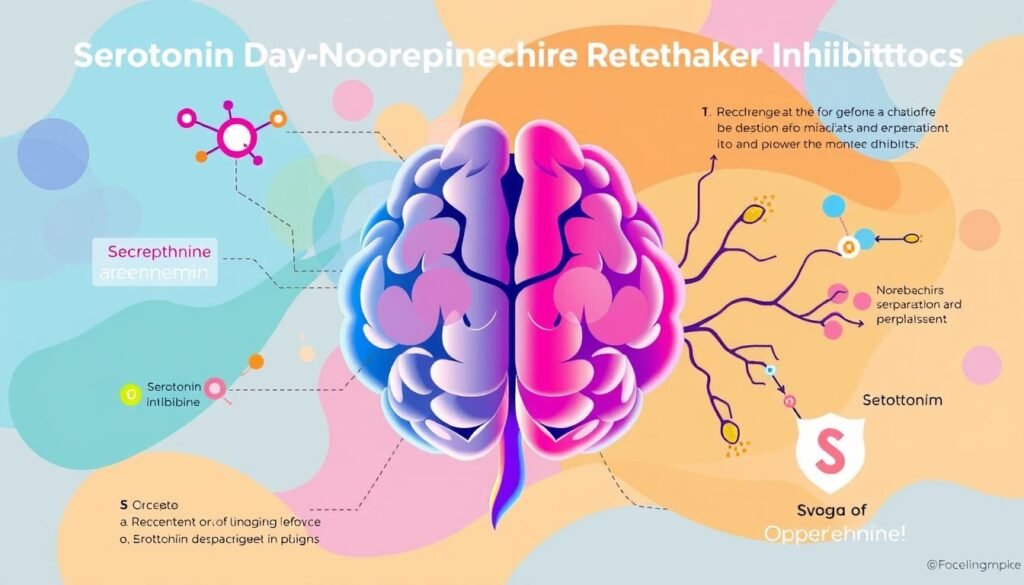Did you know that nearly 1 in 5 U.S. adults face mental illness each year? Over 17 million people deal with major depression. This shows a critical need for effective depression treatment. A key player in this fight is SNRIs (Serotonin-Norepinephrine Reuptake Inhibitors). These meds help with major depression, anxiety disorders, and some chronic pain.
It’s important to understand how SNRIs work, their benefits, and possible side effects. This knowledge is vital for anyone dealing with mental health issues. These antidepressant medications work by changing certain chemical levels in the brain. This has made them an important part of treating mental health today. For more on managing depression with SNRIs, check Mayo Clinic’s resource on antidepressants.
Key Takeaways
- SNRIs are beneficial for treating major depression and related disorders.
- This class of medications affects serotonin and norepinephrine levels in the brain.
- Awareness of potential side effects and withdrawal symptoms is crucial.
- Regular communication with healthcare providers ensures effective treatment.
- Patients under 25 may experience increased suicidal thoughts at the start of treatment.
Introduction to SNRIs and Major Depression
Serotonin-norepinephrine reuptake inhibitors, known as SNRIs, have been key for Major Depression since the mid-1990s. These antidepressant medications help people tackle depression head-on. They boost serotonin and norepinephrine levels, which are crucial for good mood.
Todat, we have seven SNRIs, including desvenlafaxine, duloxetine, and venlafaxine. Each one works in its own way. For instance, milnacipran is used for both Major Depression and fibromyalgia. This shows how SNRIs can help with different health issues.
Studies show SNRIs help those who haven’t found relief with other treatments or have anxiety too. Drugs like duloxetine are better than placebo in improving mood. These findings highlight SNRIs as a beacon of hope for those facing Major Depression.
Understanding how SNRIs work is key. This knowledge helps manage depression effectively. It also helps us see the importance of picking the right antidepressant medication. Working with mental health experts can aid in finding the best treatment, including SNRIs. For more info, check out this excellent resource.
| SNRIs on the Market | Uses |
|---|---|
| Desvenlafaxine | Major Depression, Anxiety Disorders |
| Duloxetine | Major Depression, Anxiety Disorders, Fibromyalgia |
| Venlafaxine | Major Depression, Anxiety Disorders |
| Milnacipran | Fibromyalgia, Off-label for Depression |
| Levomilnacipran | Major Depression |
| Indications | Off-label use, specific patient conditions |
Understanding Major Depression
Major depression is a serious mental health issue with different symptoms. It greatly affects daily life. Knowing these symptoms helps understand the big effect of depression and why good treatment is important. People with depression feel very sad, easily irritated, and see changes in how much they eat and sleep. If not treated, these can lead to bigger health problems.
Symptoms of Major Depression
Major depression symptoms vary, but often include:
- Persistent sadness or hopelessness
- Irritability and mood swings
- Loss of interest in things once enjoyed
- Changes in appetite or weight
- Sleep problems, like insomnia or sleeping too much
- Feeling very tired or lacking energy
- Hard time focusing or making choices
- Feeling worthless or very guilty
- Thinking about death or suicide, especially in serious cases
Impact of Depression on Daily Life
The depression impact on a person’s life can be huge. It affects how well they get along with others, their job, and their overall happiness. People with severe depression might struggle to do simple everyday tasks. This can make them feel alone and hopeless. There’s a clear need for good treatment. It helps reduce the disorder’s heavy toll on individuals and society.
What are Serotonin-Norepinephrine Reuptake Inhibitors (SNRIs)?
Serotonin-Norepinephrine Reuptake Inhibitors are known as SNRIs. They are a type of antidepressants for treating major depression. They work by preventing serotonin and norepinephrine from being reabsorbed too quickly. This makes these chemicals more available in the brain, which improves mood. Knowing how SNRIs work helps us understand their role in fighting depression.
How SNRIs Work on Neurotransmitters
SNRIs aim to increase serotonin and norepinephrine in the brain, which helps improve mood. These chemicals are vital for mood regulation. When they’re reabsorbed into nerve cells, mood can worsen. By stopping this reabsorption, SNRIs help keep a good balance of neurotransmitters. This leads to better communication between brain cells.
Approved SNRIs for Major Depression Treatment
There are several SNRIs approved by the FDA to treat major depression. They each have unique features. Here’s a brief list of notable SNRIs that have been approved:
| Medication | Approval Year | Serotonin:Norepinephrine Ratio | Half-Life (hours) |
|---|---|---|---|
| Venlafaxine (Effexor™) | 1993 (extended-release in 1997) | 30:1 | 5 |
| Duloxetine (Cymbalta™) | 2004 | 10:1 | 12 |
| Desvenlafaxine (Pristiq™) | 2008 | 10:1 | 11 |
| Levomilnacipran (Fetzima) | 2013 | Not specified | Not specified |

These approved SNRIs are effective in treating depression. Each drug has its own action profile, which is important in patient care. Healthcare providers must choose the right treatment for each patient. Knowing the differences between these drugs helps in treating depression well.
Benefits of Using SNRIs for Depression Treatment
SNRIs help a lot with major depression. They do more than just ease the symptoms. They also improve mental health overall. Many people find that SNRIs help with more than just mood. They also help with anxiety and chronic pain that often go with depression.
Improving Mood and Reducing Symptoms
SNRIs work by making more serotonin and norepinephrine available in the brain. These are chemicals that help control our mood and emotions. Studies have shown that SNRIs are often better than SSRIs, especially for severe depression. Many patients start to feel better after a few weeks of treatment.
Additional Benefits for Anxiety and Chronic Pain Management
SNRIs are also good for treating anxiety and chronic pain. Duloxetine and venlafaxine are two SNRIs that are really effective for chronic pain conditions. This includes problems like fibromyalgia and diabetic neuropathy. About 30% of people in the U.S. suffer from chronic pain. SNRIs have been proven to offer them relief. For instance, people with chronic knee pain from osteoarthritis felt better when they took duloxetine.

People with ongoing pain, like cancer patients, gain a lot from SNRIs. Research shows that SNRIs improve the quality of life for those dealing with depression and chronic pain. For many, the blend of better mood and less pain highlights the value of SNRIs in treatment plans.
If you’re thinking about SNRIs, talking to a health professional is a good first step. It’s key to understand both the benefits and potential side effects. This helps in making wise health decisions.
Serotonin-Norep (SNRIs): A Treatment Option for Depression
SNRI medications have become a top SNRIs Treatment Option for those fighting major depression. They boost serotonin and norepinephrine in the brain, helping with mood disorders and more. Now, there are eight FDA-approved SNRIs in the United States, showing great advances in treating mental health.
The journey started with venlafaxine in 1994. Following it, duloxetine (Cymbalta) in 2004 and levomilnacipran in 2013 were approved. This progress highlights the growing understanding of mental health. SNRIs are now used for major depression, anxiety, and chronic pain, making them a versatile tool for doctors.
Creating a personal treatment plan is crucial for those with major depression. SNRIs are beneficial as they can tackle a wide range of symptoms. Yet, finding the right SNRI and dose may take time, as reactions vary. For more details on SNRIs, click here.

Add lifestyle changes to SNRI use for better results. A full plan including meds, therapy, and self-care can boost life quality for someone with major depression. Thus, SNRIs play a major role in fighting this tough mental health issue.
Common SNRIs Prescribed
It’s important to know about common SNRIs for managing major depression and related issues. Each medication has unique benefits and fits different therapeutic needs.
Duloxetine (Cymbalta)
Duloxetine treats major depression, anxiety, and pain conditions like neuropathy and osteoarthritis. It works by blocking serotonin and norepinephrine reuptake. This approach is effective for both mood disorders and chronic pain.
For muscle and joint pain, doses range from 30 to 60 mg daily. Studies show significant pain improvement, especially for knee osteoarthritis with 60 mg/day. It also helps diabetic neuropathy, outperforming placebo in trials.
Venlafaxine (Effexor XR)
Venlafaxine, another key SNRI, tackles major depression and anxiety by boosting serotonin and norepinephrine levels. It’s especially helpful for fibromyalgia and neuropathic pain, improving life quality for these patients.
However, it can raise blood pressure, so doctors must monitor patients closely.
Desvenlafaxine (Pristiq)
Desvenlafaxine comes from venlafaxine and fights major depression similarly. It eases physical symptoms of depression, like pain and discomfort.
Dosing and side effects need careful management for the best results with SNRIs.
Levomilnacipran (Fetzima)
Levomilnacipran is a new SNRI approved for major depression. It focuses more on norepinephrine, helping those not helped by other antidepressants. Its dosage needs careful adjustment for effectiveness and tolerability.
The unique profiles of these SNRIs let doctors customize treatments. For more information, click here.
Possible Side Effects of SNRIs
When using SNRIs to treat depression, knowing the side effects is essential. They can vary from mild to severe. So, managing them correctly is crucial during therapy.
Common Side Effects
While on SNRIs, people may face some mild or moderate side effects. These include:
- Nausea
- Dry mouth
- Dizziness
- Constipation
- Insomnia
- Fatigue
Often, these side effects lessen as the body gets used to the medicine. Everyone should watch how they feel closely. This helps figure out how serious or impactful these effects are.
Serious Risks and Safety Concerns
There are also serious risks with SNRIs that need attention. Here are major safety concerns:
- Elevated blood pressure, especially with Venlafaxine at high doses
- Abnormal heartbeats with too much Citalopram
- The danger of serotonin syndrome, which can be deadly
- Withdrawal symptoms if doses are skipped or stopped suddenly
- More suicidal thoughts or actions in young adults
Knowing these risks helps patients and doctors watch for and handle any bad reactions during treatment.
Managing Side Effects While Taking SNRIs
Handling side effects well is key when using serotonin-norepinephrine reuptake inhibitors (SNRIs). Many people report side effects, which can lead them to stop treatment. To reduce these side effects, it’s good to eat healthily, drink lots of water, and stay active. These actions can lessen issues like gaining weight, having trouble sleeping, and getting a dry mouth. This makes treatment better overall.
Strategies to Minimize Side Effects
Talking openly with healthcare providers is very important. It helps you manage SNRI side effects better. For example, if you have constipation or feel dizzy, you can find solutions by talking about it. You might need to change what you eat or eat more foods rich in fiber. Regular meetings ensure side effects are handled quickly.
Importance of Open Communication with Healthcare Providers
Patients need to keep talking to their healthcare providers about their SNRI treatment. This is crucial because doctors may not fully realize how common side effects are. By sharing your treatment experiences, you can get care that fits your needs. This also helps your mental health journey. Such communication means you and your provider can manage side effects better, leading to more effective treatment.